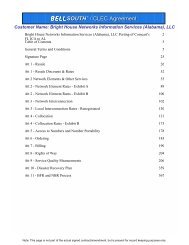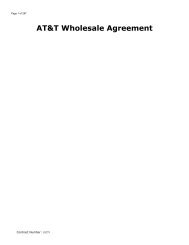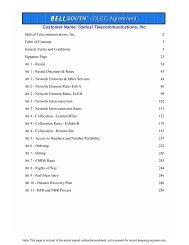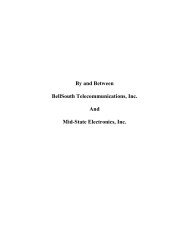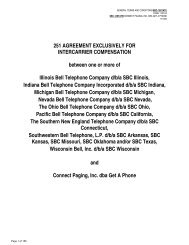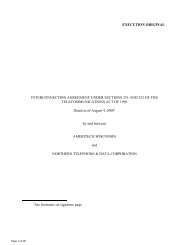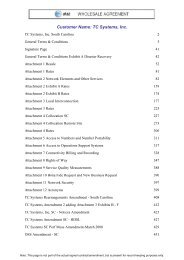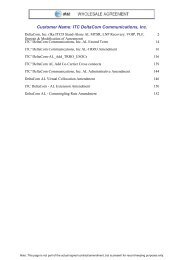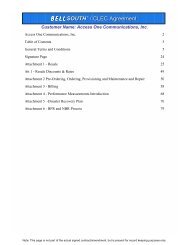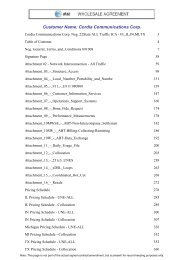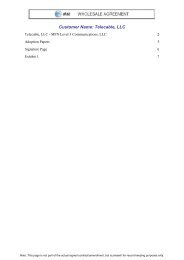- Page 4 and 5:
GENERAL TERMS AND CONDITIONS /SOUTH
- Page 6 and 7:
GENERAL TERMS AND CONDITIONS /SOUTH
- Page 8 and 9:
Other Requirements (cont.) Attachme
- Page 10 and 11:
1. INTRODUCTION GENERAL TERMS AND C
- Page 12 and 13:
GENERAL TERMS AND CONDITIONS /SOUTH
- Page 14 and 15:
GENERAL TERMS AND CONDITIONS /SOUTH
- Page 16 and 17:
GENERAL TERMS AND CONDITIONS /SOUTH
- Page 18 and 19:
GENERAL TERMS AND CONDITIONS /SOUTH
- Page 20 and 21:
7.5 OSHA Statement GENERAL TERMS AN
- Page 22 and 23:
GENERAL TERMS AND CONDITIONS /SOUTH
- Page 24 and 25:
GENERAL TERMS AND CONDITIONS /SOUTH
- Page 26 and 27:
8.6 Intentionally Left Blank. GENER
- Page 28 and 29:
# Conformed to Docket 28821 GENERAL
- Page 30 and 31:
8.13 Intentionally left blank. GENE
- Page 32 and 33:
GENERAL TERMS AND CONDITIONS /SOUTH
- Page 34 and 35:
Commission. GENERAL TERMS AND CONDI
- Page 36 and 37:
GENERAL TERMS AND CONDITIONS /SOUTH
- Page 38 and 39:
15. NETWORK MAINTENANCE AND MANAGEM
- Page 40 and 41:
GENERAL TERMS AND CONDITIONS /SOUTH
- Page 42 and 43:
21. CONSENT GENERAL TERMS AND CONDI
- Page 44 and 45:
31. INTENTIONALLY LEFT BLANK 32.# V
- Page 46 and 47:
GENERAL TERMS AND CONDITIONS /SOUTH
- Page 48 and 49:
GENERAL TERMS AND CONDITIONS /SOUTH
- Page 50 and 51:
43. SEVERABILITY GENERAL TERMS AND
- Page 52 and 53:
GENERAL TERMS AND CONDITIONS /SOUTH
- Page 54 and 55:
GENERAL TERMS AND CONDITIONS /SOUTH
- Page 56 and 57:
ATTACHMENT 1: RESALE ATTACHMENT 1:
- Page 58 and 59:
- 976 Information Delivery Service
- Page 60 and 61:
ATTACHMENT 1: RESALE/SOUTHWESTERN B
- Page 62 and 63:
5.0 No Restrictions on Resale ATTAC
- Page 64 and 65:
ATTACHMENT 1: RESALE/SOUTHWESTERN B
- Page 66 and 67:
ATTACHMENT 1: RESALE/SOUTHWESTERN B
- Page 68 and 69:
APPENDIX CUSTOMIZED ROUTING-RESALE/
- Page 70 and 71:
ATACHMENT6: 251(C)(3) UNE/SOUTHWEST
- Page 72 and 73:
ATACHMENT6: 251(C)(3) UNE/SOUTHWEST
- Page 74 and 75:
ATACHMENT6: 251(C)(3) UNE/SOUTHWEST
- Page 76 and 77:
ATACHMENT6: 251(C)(3) UNE/SOUTHWEST
- Page 78 and 79:
ATACHMENT6: 251(C)(3) UNE/SOUTHWEST
- Page 80 and 81:
ATACHMENT6: 251(C)(3) UNE/SOUTHWEST
- Page 82 and 83:
ATACHMENT6: 251(C)(3) UNE/SOUTHWEST
- Page 84 and 85:
ATACHMENT6: 251(C)(3) UNE/SOUTHWEST
- Page 86 and 87:
ATACHMENT6: 251(C)(3) UNE/SOUTHWEST
- Page 88 and 89:
ATACHMENT6: 251(C)(3) UNE/SOUTHWEST
- Page 90 and 91:
ATACHMENT6: 251(C)(3) UNE/SOUTHWEST
- Page 92 and 93:
ATACHMENT6: 251(C)(3) UNE/SOUTHWEST
- Page 94 and 95:
ATACHMENT6: 251(C)(3) UNE/SOUTHWEST
- Page 96 and 97:
ATACHMENT6: 251(C)(3) UNE/SOUTHWEST
- Page 98 and 99: 4.16 Engineering Controlled Splice
- Page 100 and 101: ATACHMENT6: 251(C)(3) UNE/SOUTHWEST
- Page 102 and 103: ATACHMENT6: 251(C)(3) UNE/SOUTHWEST
- Page 104 and 105: ATACHMENT6: 251(C)(3) UNE/SOUTHWEST
- Page 106 and 107: ATACHMENT6: 251(C)(3) UNE/SOUTHWEST
- Page 108 and 109: ATACHMENT6: 251(C)(3) UNE/SOUTHWEST
- Page 110 and 111: 13.0 Maintenance/Repairs/Testing AT
- Page 112 and 113: ABS APPENDIX /SOUTHWESTERN BELL TEL
- Page 114 and 115: ABS APPENDIX /SOUTHWESTERN BELL TEL
- Page 116 and 117: ABS APPENDIX /SOUTHWESTERN BELL TEL
- Page 118 and 119: ABS APPENDIX /SOUTHWESTERN BELL TEL
- Page 120 and 121: REMAND ORDER EMBEDDED BASE TEMPORAR
- Page 122 and 123: REMAND ORDER EMBEDDED BASE TEMPORAR
- Page 124 and 125: REMAND ORDER EMBEDDED BASE TEMPORAR
- Page 126 and 127: REMAND ORDER EMBEDDED BASE TEMPORAR
- Page 128 and 129: ATTACHMENT 11: NIA/SOUTHWESTERN BEL
- Page 130 and 131: ATTACHMENT 11: NIA/SOUTHWESTERN BEL
- Page 132 and 133: 1.0 Introduction ATTACHMENT 11: APP
- Page 134 and 135: 2.6 E911 Emergency Traffic ATTACHME
- Page 136 and 137: ATTACHMENT 11: APPENDIX ITR/SOUTHWE
- Page 138 and 139: ATTACHMENT 11: APPENDIX ITR/SOUTHWE
- Page 140 and 141: ATTACHMENT 11: APPENDIX NIM/SOUTHWE
- Page 142 and 143: 3.0 Joint Facility Growth Planning
- Page 144 and 145: 1.0 Introduction ATTACHMENT 12: COM
- Page 146 and 147: ATTACHMENT 12: COMPENSATION/SOUTHWE
- Page 150 and 151: ATTACHMENT 12: COMPENSATION/SOUTHWE
- Page 152 and 153: ATTACHMENT 12: COMPENSATION/SOUTHWE
- Page 154 and 155: ATTACHMENT 12: COMPENSATION/SOUTHWE
- Page 156 and 157: 10.0 Compensation for Termination o
- Page 158 and 159: ATTACHMENT 12: COMPENSATION/SOUTHWE
- Page 160 and 161: APPENDIX COLLOCATION APPENDIX COLLO
- Page 162 and 163: APPENDIX COLLOCATION/SOUTHWESTERN B
- Page 164 and 165: Appendix Poles, Conduits, and Right
- Page 166 and 167: Appendix Poles, Conduits, and Right
- Page 168 and 169: Appendix Poles, Conduits, and Right
- Page 170 and 171: Appendix Poles, Conduits, and Right
- Page 172 and 173: Appendix Poles, Conduits, and Right
- Page 174 and 175: Appendix Poles, Conduits, and Right
- Page 176 and 177: Appendix Poles, Conduits, and Right
- Page 178 and 179: Appendix Poles, Conduits, and Right
- Page 180 and 181: Appendix Poles, Conduits, and Right
- Page 182 and 183: Appendix Poles, Conduits, and Right
- Page 184 and 185: Appendix Poles, Conduits, and Right
- Page 186 and 187: Appendix Poles, Conduits, and Right
- Page 188 and 189: Appendix Poles, Conduits, and Right
- Page 190 and 191: Appendix Poles, Conduits, and Right
- Page 192 and 193: Appendix Poles, Conduits, and Right
- Page 194 and 195: Appendix Poles, Conduits, and Right
- Page 196 and 197: Appendix Poles, Conduits, and Right
- Page 198 and 199:
Appendix Poles, Conduits, and Right
- Page 200 and 201:
Appendix Poles, Conduits, and Right
- Page 202 and 203:
Appendix Poles, Conduits, and Right
- Page 204 and 205:
Appendix Poles, Conduits, and Right
- Page 206 and 207:
Appendix Poles, Conduits, and Right
- Page 208 and 209:
Appendix Poles, Conduits, and Right
- Page 210 and 211:
Appendix Poles, Conduits, and Right
- Page 212 and 213:
EXHIBIT I POLE AND CONDUIT ATTACHME
- Page 214 and 215:
EXHIBIT III ADMINISTRATIVE FORMS AN
- Page 216 and 217:
POLES EXHIBIT IV/SOUTHWESTERN BELL
- Page 218 and 219:
POLES EXHIBIT IV/SOUTHWESTERN BELL
- Page 220 and 221:
POLES EXHIBIT V/SOUTHWESTERN BELL T
- Page 222 and 223:
POLES EXHIBIT V/SOUTHWESTERN BELL T
- Page 224 and 225:
EXHIBIT VII NOTICES TO SBC TEXAS (T
- Page 226 and 227:
POLES EXHIBIT VII/SOUTHWESTERN BELL
- Page 228 and 229:
Southwestern Bell Telephone PRE-OCC
- Page 230 and 231:
Southwestern Bell Telephone Retenti
- Page 232 and 233:
Southwestern Bell Telephone License
- Page 234 and 235:
ATTACHMENT 14: LOCATION ROUTING NUM
- Page 236 and 237:
ATTACHMENT 14: LOCATION ROUTING NUM
- Page 238 and 239:
4. Pricing ATTACHMENT 14: LOCATION
- Page 240 and 241:
ATTACHMENT 15: E911 ATTACHMENT 15:
- Page 242 and 243:
ATTACHMENT 15: E911/SOUTHWESTERN BE
- Page 244 and 245:
ATTACHMENT 15: E911/SOUTHWESTERN BE
- Page 246 and 247:
ATTACHMENT 15: E911/SOUTHWESTERN BE
- Page 248 and 249:
ADDENDUM II BASIS OF COMPENSATION A
- Page 250 and 251:
ATTACHMENT 16: NETWORK SECURITY/SOU
- Page 252 and 253:
4. General Assessments Payable to t
- Page 254 and 255:
APPENDIX TO ATTACHMENT 17 PERFORMAN
- Page 256 and 257:
APPENDIX TO ATTACHMENT 17 PERFORMAN
- Page 258 and 259:
APPENDIX TO ATTACHMENT 17 PERFORMAN
- Page 260 and 261:
APPENDIX TO ATTACHMENT 17 PERFORMAN
- Page 262 and 263:
APPENDIX TO ATTACHMENT 17 PERFORMAN
- Page 264 and 265:
APPENDIX TO ATTACHMENT 17 PERFORMAN
- Page 266 and 267:
APPENDIX TO ATTACHMENT 17 PERFORMAN
- Page 268 and 269:
APPENDIX TO ATTACHMENT 17 PERFORMAN
- Page 270 and 271:
APPENDIX TO ATTACHMENT 17 PERFORMAN
- Page 272 and 273:
APPENDIX TO ATTACHMENT 17 PERFORMAN
- Page 274 and 275:
B. Billing APPENDIX TO ATTACHMENT 1
- Page 276 and 277:
APPENDIX TO ATTACHMENT 17 PERFORMAN
- Page 278 and 279:
APPENDIX TO ATTACHMENT 17 PERFORMAN
- Page 280 and 281:
APPENDIX TO ATTACHMENT 17 PERFORMAN
- Page 282 and 283:
APPENDIX TO ATTACHMENT 17 PERFORMAN
- Page 284 and 285:
APPENDIX TO ATTACHMENT 17 PERFORMAN
- Page 286 and 287:
APPENDIX TO ATTACHMENT 17 PERFORMAN
- Page 288 and 289:
APPENDIX TO ATTACHMENT 17 PERFORMAN
- Page 290 and 291:
APPENDIX TO ATTACHMENT 17 PERFORMAN
- Page 292 and 293:
APPENDIX TO ATTACHMENT 17 PERFORMAN
- Page 294 and 295:
APPENDIX TO ATTACHMENT 17 PERFORMAN
- Page 296 and 297:
APPENDIX TO ATTACHMENT 17 PERFORMAN
- Page 298 and 299:
- Residence - Business 2. UNE-P 3.
- Page 300 and 301:
APPENDIX TO ATTACHMENT 17 PERFORMAN
- Page 302 and 303:
APPENDIX TO ATTACHMENT 17 PERFORMAN
- Page 304 and 305:
H. Collocation APPENDIX TO ATTACHME
- Page 306 and 307:
APPENDIX TO ATTACHMENT 17 PERFORMAN
- Page 308 and 309:
APPENDIX TO ATTACHMENT 17 PERFORMAN
- Page 310 and 311:
APPENDIX TO ATTACHMENT 17 PERFORMAN
- Page 312 and 313:
ATTACHMENT 18: DIRECTORY ASSISTANCE
- Page 314 and 315:
ATTACHMENT 19: WP-O/SOUTHWESTERN BE
- Page 316 and 317:
3. USE OF SUBSCRIBER LISTING INFORM
- Page 318 and 319:
ATTACHMENT 21: NUMBERING ATTACHMENT
- Page 320 and 321:
3.0 Call Branding ATTACHMENT 22: DA
- Page 322 and 323:
ATTACHMENT 22: DA-FAC/SOUTHWESTERN
- Page 324 and 325:
ATTACHMENT 23: OS-FB/SOUTHWESTERN B
- Page 326 and 327:
9. Pricing ATTACHMENT 23: OS-FB/SOU
- Page 328 and 329:
1.0 Introduction ATTACHMENT 24: REC
- Page 330 and 331:
ATTACHMENT 24: RECORDING/SOUTHWESTE
- Page 332 and 333:
ATTACHMENT 24: RECORDING/SOUTHWESTE
- Page 334 and 335:
RECORDING EXHIBIT 1/SOUTHWESTERN BE
- Page 336 and 337:
Effective January 1, 1999 COMPANY N
- Page 338 and 339:
1.0 Introduction ATTACHMENT 25: xDS
- Page 340 and 341:
Attachment 25: xDSL/SOUTHWESTERN BE
- Page 342 and 343:
Attachment 25: xDSL/SOUTHWESTERN BE
- Page 344 and 345:
Attachment 25: xDSL/SOUTHWESTERN BE
- Page 346 and 347:
Attachment 25: xDSL/SOUTHWESTERN BE
- Page 348 and 349:
Attachment 25: xDSL/SOUTHWESTERN BE
- Page 350 and 351:
Attachment 25: xDSL/SOUTHWESTERN BE
- Page 352 and 353:
Attachment 25: Appendix Line Sharin
- Page 354 and 355:
Attachment 25: Appendix Line Sharin
- Page 356 and 357:
Attachment 25: Appendix Line Sharin
- Page 358 and 359:
Attachment 25: Appendix Line Sharin
- Page 360 and 361:
Attachment 25: Appendix Line Sharin
- Page 362 and 363:
Attachment 25: Appendix UNE Line Sp
- Page 364 and 365:
Attachment 25: Appendix UNE Line Sp
- Page 366 and 367:
Attachment 25: Appendix UNE Line Sp
- Page 368 and 369:
1. INTRODUCTION ATTACHMENT 27: OPER
- Page 370 and 371:
ATTACHMENT 27: OPERATIONS SUPPORT S
- Page 372 and 373:
ATTACHMENT 27: OPERATIONS SUPPORT S
- Page 374 and 375:
ATTACHMENT 27: OPERATIONS SUPPORT S
- Page 376 and 377:
5. ORDERING/PROVISIONING ATTACHMENT
- Page 378 and 379:
ATTACHMENT 27: OPERATIONS SUPPORT S
- Page 380 and 381:
ATTACHMENT 27: OPERATIONS SUPPORT S
- Page 382 and 383:
ATTACHMENT 27: OPERATIONS SUPPORT S
- Page 384 and 385:
11.3 Additional Responsibilities of
- Page 386 and 387:
ATTACHMENT 27: OPERATIONS SUPPORT S
- Page 388 and 389:
ATTACHMENT 27: OPERATIONS SUPPORT S
- Page 390 and 391:
ATTACHMENT 27A: ADDITIONAL OPERATIO
- Page 392 and 393:
ATTACHMENT 27A: ADDITIONAL OPERATIO
- Page 394 and 395:
2. BILLING INFORMATION AND CHARGES-
- Page 396 and 397:
ATTACHMENT 28: COMPREHENSIVE BILLIN
- Page 398 and 399:
ATTACHMENT 28: COMPREHENSIVE BILLIN
- Page 400 and 401:
ATTACHMENT 28: COMPREHENSIVE BILLIN
- Page 402 and 403:
ATTACHMENT 28: COMPREHENSIVE BILLIN
- Page 404 and 405:
ATTACHMENT 28: COMPREHENSIVE BILLIN
- Page 406 and 407:
SOUTHWESTERN BELL TELEPHONE, L.P./
- Page 408 and 409:
SOUTHWESTERN BELL TELEPHONE, L.P./
- Page 410 and 411:
SOUTHWESTERN BELL TELEPHONE, L.P./
- Page 412 and 413:
SOUTHWESTERN BELL TELEPHONE, L.P./
- Page 414 and 415:
SOUTHWESTERN BELL TELEPHONE, L.P./
- Page 416 and 417:
SOUTHWESTERN BELL TELEPHONE, L.P./
- Page 418 and 419:
SOUTHWESTERN BELL TELEPHONE, L.P./
- Page 420 and 421:
SOUTHWESTERN BELL TELEPHONE, L.P./
- Page 422 and 423:
SOUTHWESTERN BELL TELEPHONE, L.P./
- Page 424 and 425:
AMENDMENT - TX DOCKET 31303 WIRE CE
- Page 426 and 427:
AMENDMENT - TX DOCKET 31303 WIRE CE
- Page 428 and 429:
ATTACHMENT A TO AMENDMENT - TX DOCK
- Page 430 and 431:
ATTACHMENT A TO AMENDMENT - TX DOCK
- Page 432 and 433:
ATTACHMENT A TO AMENDMENT - TX DOCK
- Page 434:
AMENDMENT-ROUTINE NETWORK MODIFICAT



